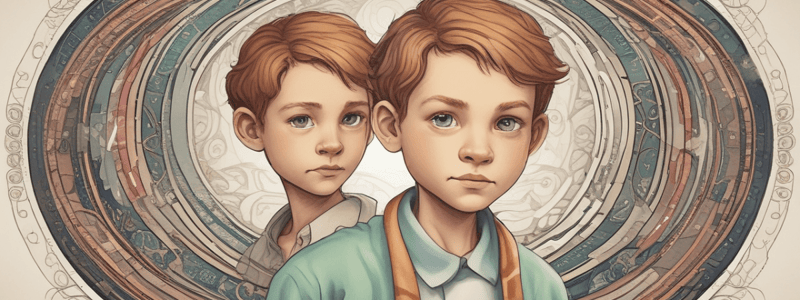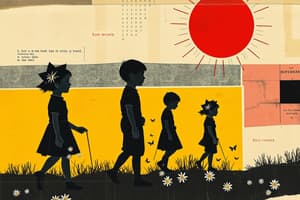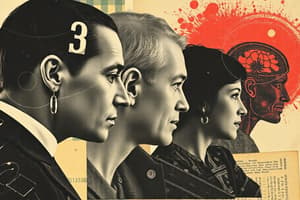Podcast
Questions and Answers
What crisis do children face during middle childhood according to Erikson's theory?
What crisis do children face during middle childhood according to Erikson's theory?
- Intimacy versus isolation
- Trust versus mistrust
- Industry versus inferiority (correct)
- Identity versus role confusion
At what stage do children believe that rules are inflexible and cannot be changed?
At what stage do children believe that rules are inflexible and cannot be changed?
- Moral relativism stage
- Moral realism stage (correct)
- Moral absolutism stage
- Moral flexibility stage
How does a child's self-concept change during middle childhood?
How does a child's self-concept change during middle childhood?
- It becomes solely dependent on external features
- It becomes less complex and more absolute
- It shifts to being more comparative and centered on feelings (correct)
- It regresses to more simple understandings
What characterizes friendships during middle childhood?
What characterizes friendships during middle childhood?
Which Big 5 personality trait relates closely to a child's discipline and goal accomplishment?
Which Big 5 personality trait relates closely to a child's discipline and goal accomplishment?
What is a potential negative influence of media and technology on children's development?
What is a potential negative influence of media and technology on children's development?
How does children's self-concept develop during middle childhood?
How does children's self-concept develop during middle childhood?
What marks the transition from moral realism to moral relativism according to Piaget?
What marks the transition from moral realism to moral relativism according to Piaget?
What is a characteristic of peer relationships in middle childhood?
What is a characteristic of peer relationships in middle childhood?
Which of the following is a consequence of children beginning to self-regulate better during middle childhood?
Which of the following is a consequence of children beginning to self-regulate better during middle childhood?
What is the relationship between culturally defined learning goals and children's sense of competence?
What is the relationship between culturally defined learning goals and children's sense of competence?
What potential positive effect does media and technology have on children's development?
What potential positive effect does media and technology have on children's development?
Flashcards are hidden until you start studying
Study Notes
Developmental Crisis
- Erikson identifies middle childhood as the stage of "Industry vs. Inferiority."
- Children develop competence through achieving culturally defined learning goals.
Personality Changes
- Middle childhood marks a willingness to work towards goals.
- Big Five personality traits:
- Extraversion
- Agreeableness
- Conscientiousness
- Neuroticism
- Openness/Intellect
Self-Concept Evolution
- Complexity of self-concept increases in middle childhood, becoming more comparative.
- Self-understanding shifts from external features to feelings and inner ideas.
Understanding Others
- Children begin to emphasize inner traits and qualities in understanding others.
- Transition from considering external characteristics to internal traits.
Moral Development
- Piaget's stages of moral development:
- Moral Realism Stage: Children view rules as fixed and unchangeable.
- Moral Relativism Stage: Children recognize that rules can change through social agreements.
- Children transition to viewing incidents as accidents rather than strictly right or wrong.
Self-Regulation and Play
- Improved self-regulation in children leads to increased parental trust and allowance for unsupervised play.
Peer Sociability and Friendships
- Peer relationships are defined by trust and dependability in friendships during middle childhood.
Media and Technology Influence
- Positive effects:
- Children acquire knowledge through media.
- Negative effects:
- Lower academic performance and increased exposure to violence.
Developmental Crisis
- Erikson identifies middle childhood as the stage of "Industry vs. Inferiority."
- Children develop competence through achieving culturally defined learning goals.
Personality Changes
- Middle childhood marks a willingness to work towards goals.
- Big Five personality traits:
- Extraversion
- Agreeableness
- Conscientiousness
- Neuroticism
- Openness/Intellect
Self-Concept Evolution
- Complexity of self-concept increases in middle childhood, becoming more comparative.
- Self-understanding shifts from external features to feelings and inner ideas.
Understanding Others
- Children begin to emphasize inner traits and qualities in understanding others.
- Transition from considering external characteristics to internal traits.
Moral Development
- Piaget's stages of moral development:
- Moral Realism Stage: Children view rules as fixed and unchangeable.
- Moral Relativism Stage: Children recognize that rules can change through social agreements.
- Children transition to viewing incidents as accidents rather than strictly right or wrong.
Self-Regulation and Play
- Improved self-regulation in children leads to increased parental trust and allowance for unsupervised play.
Peer Sociability and Friendships
- Peer relationships are defined by trust and dependability in friendships during middle childhood.
Media and Technology Influence
- Positive effects:
- Children acquire knowledge through media.
- Negative effects:
- Lower academic performance and increased exposure to violence.
Studying That Suits You
Use AI to generate personalized quizzes and flashcards to suit your learning preferences.




